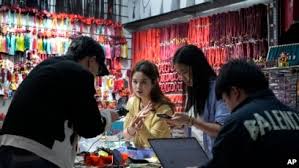Every November 11th, China witnesses an unparalleled frenzy of shopping and celebration known as Singles Day, or “Guanggun Jie”. Originally intended as a day for young, unmarried people to celebrate their singlehood, it has evolved into the world’s biggest shopping event—surpassing even the combined sales of Black Friday and Cyber Monday in the U.S. This massive cultural and economic phenomenon sheds light on China’s consumer trends and digital innovation, making it a global focal point each year.
Origins of Singles Day
Singles Day was first celebrated in 1993 by students at Nanjing University as an informal “Anti-Valentine’s Day”. The date, 11/11, was chosen for its symbolism, with four ‘ones’ representing single individuals. The idea gained popularity among university campuses and gradually became a lighthearted way for young people to acknowledge their single status and revel in their independence.
However, the event took a commercial turn when e-commerce giant Alibaba recognized its potential. In 2009, Alibaba’s then-CEO Daniel Zhang (now Chairman of Alibaba Group) transformed Singles Day into a shopping festival, offering discounts and promotions on their platforms, Taobao and Tmall. The concept was simple yet revolutionary: make shopping exciting, and in doing so, tap into the growing Chinese middle class’s disposable income.
Celebrating Singles Day
Today, Singles Day is synonymous with marathon shopping sprees, elaborate promotions, and over-the-top online and offline celebrations. While the heart of the event lies in e-commerce, it is much more than just a shopping day—it’s a nationwide spectacle marked by celebrity performances, countdown galas, and special product launches.
Shopping Frenzy and Record-Breaking Sales
The numbers tell the story. In 2022, Alibaba reported over $84.5 billion in gross merchandise volume (GMV) during the 11-day shopping period leading up to November 11th. The event has become a benchmark for gauging the purchasing power of Chinese consumers and the health of the retail industry. Beyond Alibaba, other major e-commerce platforms such as JD.com, Pinduoduo, and Suning also partake in the competition, offering their own deals and discounts.
Shoppers prepare for weeks in advance by browsing wish lists, comparing prices, and setting aside money for the big day. Mobile apps and social media play a crucial role in fueling the excitement—with influencers showcasing deals, brands engaging users through livestreams, and platforms featuring interactive games to keep users hooked.
Alibaba’s 24-hour livestream gala is a cornerstone of the event. It blends entertainment and marketing, featuring famous singers, actors, and influencers who promote products and offer special coupon codes in real-time. For instance, in 2021, Taylor Swift performed as part of the pre-event show, drawing millions of viewers and setting the stage for record-breaking transactions.
A Technological Marvel
Singles Day is as much a testament to China’s technological prowess as it is a consumer event. The scale of transactions processed on this day requires cutting-edge logistics and digital infrastructure. In 2022, over 2.32 billion delivery orders were placed within 24 hours, demonstrating the agility of China’s logistics networks. Alibaba’s Cainiao Network, a logistics affiliate, uses artificial intelligence to optimize delivery routes, ensuring that millions of packages reach customers efficiently.
Mobile payments, particularly through Alipay and WeChat Pay, simplify the purchasing process. With most consumers relying on their smartphones for transactions, it is essential for platforms to maintain robust systems capable of handling the deluge of traffic. In the past, Alibaba’s platforms have managed to sustain peak order rates of 583,000 orders per second without disruptions.
Global Impact and International Reach
Though it started as a uniquely Chinese phenomenon, Singles Day’s appeal has spread internationally. Brands and retailers from around the world now participate, eager to capture a share of the immense spending power. International luxury brands, such as Louis Vuitton and Chanel, frequently offer exclusive Singles Day collections to attract high-end shoppers.
Moreover, the event has influenced other countries to adopt similar large-scale shopping promotions. For example, India’s Flipkart and Amazon Great Indian Festival coincide with Singles Day, leveraging the heightened shopping momentum. The United States, too, has seen a gradual interest in November 11th sales, especially among retailers who want to tap into the buying enthusiasm ahead of Black Friday.
Cultural Reflections and Criticisms
While the success of Singles Day underscores China’s consumerism and digital transformation, it also draws criticism. Environmentalists have raised concerns about the ecological impact of mass consumption, particularly in terms of packaging waste and the carbon footprint associated with delivery logistics. Additionally, consumer rights advocates argue that not all deals are as great as they appear, with some merchants accused of inflating prices ahead of the event and offering misleading discounts.
There is also a growing awareness among consumers about “overconsumption”. As the event becomes more mainstream, some shoppers report experiencing “shopping fatigue” from the relentless marketing campaigns and promotional bombardment. In recent years, Alibaba has even shifted its marketing language to focus more on sustainability, promoting eco-friendly practices such as carbon offset programs and recyclable packaging options.
Singles Day has evolved far beyond its humble origins as a day to celebrate singlehood. It is now a multi-billion-dollar retail juggernaut that reflects China’s economic clout and technological capabilities. As the world watches on November 11th, it’s clear that this annual celebration is not just about shopping, but about innovation, global influence, and the changing face of consumer culture.
With the 2024 edition around the corner, all eyes will be on the digital counters as they tick up and retailers roll out even more elaborate strategies. Whether viewed as a symbol of commercial excess or an impressive showcase of technological coordination, Singles Day has cemented its place as an event that defines modern consumerism.




